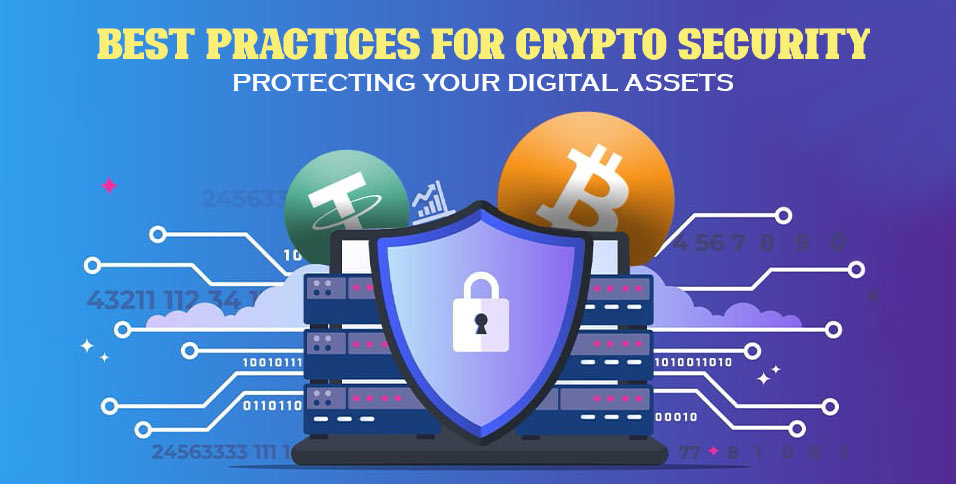Cryptocurrencies can be thrilling because they offer the potential for huge profits. However, unlike traditional investments like stocks, cryptocurrency is entirely online, which means cybercriminals can target it in non-conventional ways. Nevertheless, there are ways to protect your crypto holdings. By doing a few important things to stay safe, you can enjoy a seamless trading experience.
Why Is It Important to Keep Your Digital Assets Safe?
The digital nature of cryptocurrency makes them vulnerable to theft by hackers and scammers. Here’s why keeping your crypto safe is essential:
- It’s Your Money: Your crypto has real value, like cash or investments. Losing it through a hack or scam can be a significant financial setback
- It Can’t Be Replaced: If someone steals your credit card, you can cancel it and get a new one. Unfortunately, no bank or central authority can help with crypto in case of theft.
- Crypto Can Be a Target: The rise of cryptocurrency has made it a prime target for criminals. Hackers are constantly developing new ways to steal crypto, so staying ahead of the threats is crucial.
- Protecting Your Peace of Mind: Knowing your crypto is secure gives you peace of mind. You won’t have to worry about it being stolen and can focus on the potential it offers.
How to Protect Your Digital Assets
There is no need to jeopardize your cryptocurrency when you can easily protect it with a few precautions and actionable tips. Here are some tips to assure you that your digital assets are out of harm’s way.
1. Secure Your Accounts
- Strong Passwords: Use strong, unique passwords for every exchange and wallet you utilize. Avoid dictionary words, birthdays, and other easily guessable information. Password managers can be a great tool to generate and store these complex passwords securely.
- Multi-Factor Authentication (MFA): MFA adds an extra layer of security by requiring a secondary verification code, typically sent via your phone and prompted while entering your password when logging in.
- Beware of Public Wi-Fi: Avoid accessing your crypto accounts on public Wi-Fi networks. Hackers can easily intercept public Wi-Fi, putting your login credentials at risk.
2. Choose Reputable Platforms
- Research Exchanges and Wallets: Conduct thorough research before entrusting your crypto to any platform. Look for established exchanges with a proven track record of security and positive user reviews.
- Beware of Unregulated Platforms: Avoid platforms that lack regulatory oversight, as they may be more susceptible to fraud or mismanagement.
- Check Insurance Coverage: Some exchanges offer insurance on user holdings in case of security breaches. It is crucial to look into this factor before signing up for a platform.
3. Vigilance is Key
- Beware of Phishing Scams: Phishing emails and websites that mimic legitimate platforms are common. Double-check website addresses, and never enter your login credentials on suspicious links.
- Scrutinize Transactions: Maintain scrutiny over your transaction history. Unfamiliar or unauthorized transactions are potential red flags.
- Enable Transaction Notifications: Set up notifications to receive alerts whenever a transaction occurs on your accounts. This can help you promptly identify unauthorized activity.
4. Take Control of Your Keys
- Private Keys: These act like digital signatures, granting access to your crypto holdings. Never share your private keys with anyone. It is best to store them offline in a secure hardware wallet.
- Consider Multi-Signature Wallets: These wallets require multiple private keys to authorize transactions, adding an extra layer of security.
5. Stay Updated
- Software Updates: Always maintain the latest security patches and updates on your devices and crypto wallets. These updates are crucial in helping you stay safe from newly discovered vulnerabilities.
- Emerging Threats: Stay informed about the latest crypto security threats and scams. Reliable news sources and security blogs can be valuable resources.
What to Do If You Fall Victim to Crypto Fraud?
Despite taking precautions, there’s always a chance of encountering a sophisticated scam. If you suspect fraudulent activity on your accounts, act fast by taking the following actions right away:
- Secure Your Accounts: Immediately change your passwords and activate MFA on all potentially compromised accounts.
- Gather Evidence: Collect any documentation related to the fraudulent activity, including transaction records and communication with the scammers.
- Report the Incident: Report the scam to the relevant authorities and the platform where the fraudulent activity occurred.
- Seek Legal Help: Consider consulting a crypto scam recovery lawyer to explore your legal options and potentially recover your stolen assets.
Key Takeaways
Unlike traditional investments, cryptocurrency exists solely online, making it a target for hackers and scammers. Losing your crypto can be a huge financial setback as it can’t be replaced, and there’s no central authority to help with theft. Therefore, following a few key practices can significantly improve your crypto security and safeguard your digital assets.














